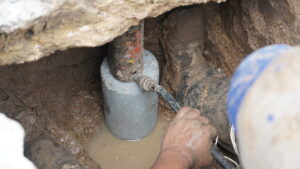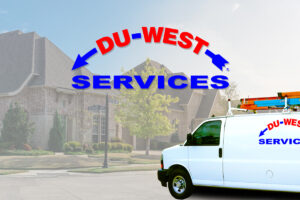How Permanant Is Concrete Leveling?
Hey there, homeowner! Have you noticed that sidewalk in front of your house starting to sink? Or maybe your driveway has developed an annoying dip that collects water every time it rains? Trust me, you’re not alone. Uneven concrete is more than just an eyesore, it’s a tripping hazard waiting to happen and often signals deeper problems with the soil underneath.
I’ve been in the concrete business for years at Du-West Services, and one question keeps popping up: “Is concrete leveling going to be a permanent solution?” Well, grab a cup of coffee, and let’s chat about it.
What Exactly Is Concrete Leveling?
Think of concrete leveling as giving your sunken slab a lift rather than tearing the whole thing out. Instead of breaking up that driveway or sidewalk (which is messy and expensive), we use special materials to raise it back to where it should be.
There are two main ways we tackle this:
- First, there’s mudjacking, basically pumping a cement-soil-water mixture under the concrete to push it up.
- Then there’s the newer polyurethane foam injection method, where we use an expanding foam that fills all those gaps and lifts the concrete back into place.
Both approaches work well, but are they a permanent fix? That’s where things get interesting.
So How Long Will My Leveled Concrete Stay Put?
Here’s the honest truth, concrete leveling can last for decades in the right conditions, but I wouldn’t call it permanent in every situation. Several things affect how long your fix will last:
The Soil Beneath Matters A Lot
If your soil is stable, you’re golden. But if it’s the type that shifts, erodes, or compresses easily, your concrete might start its downward journey again sometime down the road.
I was working on a house in the hills last year where the soil was so unstable that we had to do some serious ground reinforcement before even thinking about leveling the driveway. That extra step made all the difference.
Water: Friend or Foe?
Water management is huge when it comes to keeping your concrete level. Too much moisture can wash away supporting soil, while extreme dryness causes soil to shrink. Either way, your concrete ends up moving.
Good drainage is absolutely key here. I always tell my clients that fixing the concrete without addressing drainage issues is like putting a bandaid on a leaky pipe it might look better temporarily, but the fundamental problem remains.
Those Beautiful Trees Might Be Troublemakers
Don’t get me wrong, I love mature trees as much as the next person. But their roots can be concrete’s worst enemy. Large roots push upward on slabs, while decomposing roots create voids that lead to sinking.
If you’ve got big trees close to your concrete, keep an eye on things. Sometimes strategic root pruning (done by professionals who know how to do it without harming the tree) can help.
Quality Work Makes a Difference
Let’s be real, not all concrete leveling is created equal. If corners are cut during the process or if subpar materials are used, that “fix” might not last through next summer.
Heavy Loads Take Their Toll
That RV or boat parked on your driveway? It’s putting significant pressure on the concrete. Areas that support heavy weights need extra reinforcement underneath to prevent future sinking.
When Should You Call in the Pros?
Don’t wait until someone trips on your uneven sidewalk or your car bottoms out on the driveway. Early intervention saves money and headaches.
Here’s when you should pick up the phone:
- You notice visible cracks or uneven surfaces
- Water pools in certain spots after rain
- Your garage door or garden gate starts sticking because the ground has shifted
- The concrete feels slightly bouncy when you walk on it
- Family members have started commenting on trip hazards
At Du-West, we look beyond the symptoms to address what’s really causing the problem. That’s the difference between a quick fix and a lasting solution.
What to Expect During the Concrete Leveling Process
Curious about what happens when you schedule concrete leveling?
Here’s the rundown:
- First, we’ll check out the problem area thoroughly. We’re looking for soil issues, drainage problems, and how much settlement has occurred.
- Based on what we find, we’ll recommend either mudjacking or polyurethane foam injection—whichever makes more sense for your specific situation.
- Then we drill small holes in the concrete (don’t worry, they’re not huge) to create entry points for our leveling material. The number of holes depends on the size of the area and which method we’re using.
- Next comes the actual leveling—pumping in either that cement slurry or expanding foam underneath the concrete to raise it back up. This is where experience really counts it takes skill to get the concrete perfectly level again.
- Once we’ve got your concrete back where it belongs, we seal up those holes, making them nearly invisible. Then we clean everything up and make sure the newly leveled concrete is stable and ready to use.
The Bottom Line: Can Concrete Leveling Be Permanent?
Under ideal conditions, stable soil, good drainage, quality workmanship concrete leveling can indeed be a very long-term solution. But I wouldn’t use the word permanent without those qualifiers.
At Du-West Services, we don’t just level your concrete and disappear. We help you understand what caused the problem in the first place and how to prevent a repeat performance. Because let’s face it nobody wants to deal with sinking concrete twice.

